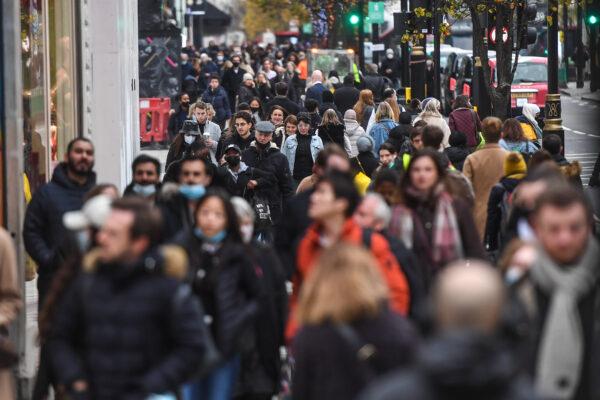The Centre for Policy Studies says large-scale migration is putting pressure on all aspects of housing, with new housing stock unable to keep up with demand.
Immigration is “significantly exacerbating the housing crisis,” putting pressure on the renting market and social housing and affecting housing costs, a think tank has said.
The Centre for Policy Studies (CPS) report “Taking Back Control” published on Wednesday said that net migration accounted for 55 percent of additional housing demand in England in the year to March 2023. Over the last decade, net migration has contributed to 89 percent of the 1.34 million increase in England’s housing deficit, the think tank said.
“Even without migration, we would still need more housing—much more housing,” report authors said, but noted that “migration is making the problem so much more severe—as well as diluting public consent for the housebuilding we need.”
The report is co-authored by Conservative MP Robert Jenrick, who resigned as immigration minister in December in protest at Prime Minister Rishi Sunak’s Rwanda plan, which he said was not strong enough to deter illegal immigration.
Mr. Jenrick has been urging the prime minister to curb legal immigration. In December 2023, the Office for National Statistics (ONS) revised net migration figures for 2022 to 745,000—a record high and up from the initial estimate of 606,000.
Pressures on Renting and Social Housing
The wide-ranging report found that beyond affecting the housing deficit—the number of houses the UK has underbuilt by—large-scale immigration has impacted the cost of buying houses, as well.
Using a government model on how the size of households and total housing stock relates to housing prices, the think tank calculated that between 2012 and 2022—when the housing stock increased by around 2.23 million—the concurrent rise in population via immigration by 2.92 million had “cancelled out three-fifths of the downwards pressure on prices from expanding the housing stock, eating up most of the benefits of that increased supply.”
It is not only the buyers’ market that is feeling the pressure from immigration, but renters, as well, the think tank said. The CPS, which describe itself as centre-right, cited a 2017 ONS study which found that recent migrants are more likely to privately rent than buy or live in social housing, with 80 percent of non-EU and 88 percent of EU migrants who arrived between 2014 and 2016 being private renters.
“Assuming these figures are still roughly correct, then in 2022 there was a net increase of around 450,000 people entering the rental market in England,” the CPS said.
The CPS also focused on the impact students are having on local housing stock, noting that while universities are “importing international students and capturing most of the value through high student fees,” costs of these individuals are externalised, “borne by local communities in terms of increased pressure on public services and infrastructure, and higher rents and house prices.”
Social housing is “disproportionately occupied by people born overseas,” the report also argues, “including those who will have since become British citizens.” Twenty percent of the heads of households in social housing in England were born overseas. In Greater London, almost half—47.8 percent—were from abroad.
“It is abundantly clear that if we are to fix the housing crisis we need to massively increase rates of housebuilding while also getting net migration down to sensible levels, otherwise we are forever going to be running up a down escalator,” the report said.
Back to Net Migration in the ‘Tens of Thousands’
To remedy the pressures that the current immigration system is putting on Britons, the think tank proposes returning net migration to the tens of thousands annually. Proposals also include capping health and care visas at 30,000, getting rid of the graduate route for international students, and indexing salary thresholds for visas in line with inflation.
The CPS also argues that the Home Office should be split in two, with one half becoming the Department for Border Security and Immigration Control, and the other half forming a Department for Policing and National Security.
Mr. Jenrick said the changes “would finally return numbers to the historical norm and deliver the highly-selective, highly-skilled immigration system voters were promised. These policies could be implemented immediately and would consign low-skilled mass migration to the past.”
 Crowds of shoppers are seen on Oxford Street in London on Dec. 2, 2020. (Peter Summers/Getty Images)
Crowds of shoppers are seen on Oxford Street in London on Dec. 2, 2020. (Peter Summers/Getty Images)“Immigration is consistently one of the top concerns of voters and they deserve a department whose sole mission is controlling immigration and securing our borders. For far too long, the Home Office has proven incapable of doing that,” he added.
A Government spokesperson responded to the report, saying that the prime minister and home secretary “have been clear that current levels of migration are far too high. That is why the Government announced a plan to cut the number of migrants that would have come last year to the UK by 300,000—the largest reduction ever.”
The spokesperson said the plan is already working, with the latest statistics showing applications across three major visa categories are down by 24 percent.
“Our approach is fair—reducing immigration and ensuring businesses invest in and recruit from the domestic workforce, whilst prioritising the overseas workers and students who will contribute significantly to our economy,” the spokesperson said.
PA Media contributed to this report.














 English (US) ·
English (US) ·  Turkish (TR) ·
Turkish (TR) ·